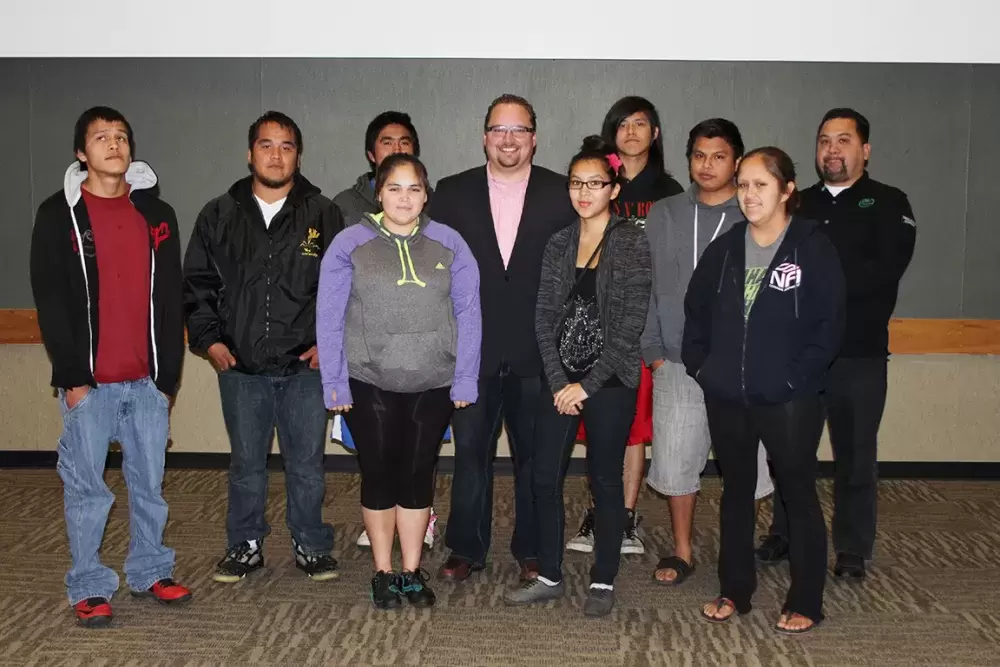Travel. Daycare. And level of education.
These are the top barriers to employment for Nuu-chah-nulth young people and the top three issues that the federal Enhanced Service Delivery initiative needs to find solutions to if the pilot program is to succeed.
So says Andy Callicum, manager of the Nuu-chah-nulth Employment and Training Program, who wanted to ensure that MP Mark Strahl heard these three concerns clearly.
Strahl, Parliamentary Secretary for Aboriginal Affairs and Northern Development, met with Nuu-chah-nulth youth, employers and program delivery staff in the conference centre at Tin Wis Sept. 9 for a roundtable discussion on the effectiveness, so far, of the Enhanced Service Delivery program.
Callicum said that his statistics show that 90 per cent of NETP’s clients have left employment because of problems around travel and daycare. And many don’t have the high school requisite education to get even the most entry level employment positions in the first place.
These issues come as no surprise to Strahl, who held a similar roundtable in the lower mainland, and in Calgary with Aboriginal Affairs Minister Bernard Valcourt. He said there are some common themes developing that government will have to consider and make adjustments going forward before the four-year pilot program is complete.
The Enhanced Service Delivery Program grew out of the federal government’s Economic Action Plan 2013. In that plan was a commitment to work with First Nations to improve the on-reserve Income Assistance Program by getting youth ages 19 to 24 the skills and training they need to secure employment. This training could be life skills, career counselling or formal education.
Not all First Nation communities across Canada are part of the program. Those chosen had to have an infrastructure in place to participate, said Strahl. The Nuu-chah-nulth Tribal Council seemed especially suited to take part, with NETP well established, and other departmental supports in place, like the social development and mental health operations.
Yet even armed with new tools, certificates and additional training, there remain barriers to employment for many.
For example, Callicum said he heard from employer Western Forest Products who said they would like to hire more Nuu-chah-nulth for their operations, but applicants needed to have the minimum class 5 driver’s licence. NETP took that concern seriously and began to put interested clients through driver training and many now have their learner’s permits.
But then another wall came up.
What were the chances that these new drivers would have access to cars and drivers over the age of 25 who would be willing to let them get behind the wheel and practice for their novice level? So NETP worked to get clients the in-car training they required and a new crop of N’s should soon be appearing on the program’s facebook page, he said. NETP posted pictures of clients with their L's and hope to do the same after they graduate to the N level.
Daycare is another concern raised by many at the roundtable. Callicum said there should be a way to encourage the development of daycare as a business opportunity for some. At Ditidaht Nation, Georgina Sutherland said the community provides daycare, and has recently added staff with the growing demand of those in training and going off to work.
She was also concerned about travel. The community doesn’t want people hitchhiking on the logging roads in and out of the community to be able to hold down a job.
Strahl said that’s the challenge. The people aren’t where the work is.
On the west coast there is no bus service, so getting from the reserves is a costly business for many, said Iris Frank. She also said there is a need to look beyond basic life skills by folding in the mental health component with personal counselling. The legacy of the residential school era means there is intergenerational trauma that must be acknowledged.
She said the age requirement of the program is also an issue, with many older than 24 interested in taking part. And investment must be made in those younger, to prepare them to take advantage of the opportunities that will come their way.
Other concerns included the high turnover of staff, the “save you” mentality of some, rather than a collaborative approach, and the need to see what a community already has in place and build on it, rather than come in with something new and different.
The important thing is to have staff that the young people can be certain of, said Sutherland, because even to have one person behind them that trusts that they will do well will make all the difference in the world.
In his closing remarks, Strahl thanked the youth for coming and sharing what they thought of the program. “You are the reason why this is all happening.”
He said the federal government will continue to monitor the program. “This will only work if we are doing it the right way.”
Tla-o-qui-aht Tyee Ha’wilth Hiyouweah had watched the roundtable unfold. Standing at the head of the room with wife Haquum-naa-nulth and other Tla-o-qui-ahts, Hiyouweah, through speaker Terry Dorward, thanked Secretary Strahl for visiting the territory.
And he thanked the youth specifically for “taking the necessary steps to succeed.”







